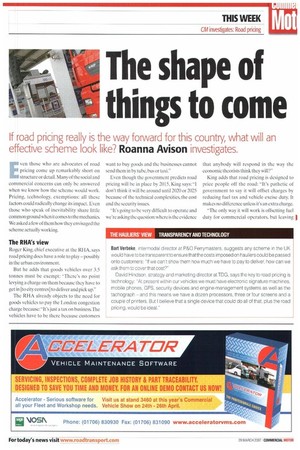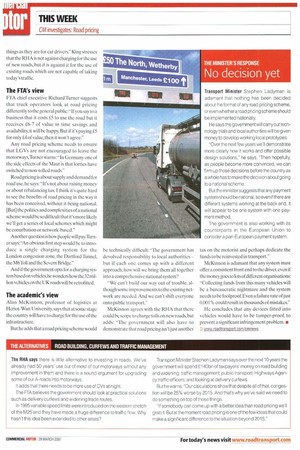The shape of things to come
Page 29

Page 30

If you've noticed an error in this article please click here to report it so we can fix it.
If road pricing really is the way forvvard for this country, what will an
effective scheme look like? Roanna Avison investigates.
Even those who are advocates of road pricing come up remarkably short on structure or detail. Many of the social and commercial concerns can only be answered when we know how the scheme would work. Pricing, technology, exemptions: all these factors could radically change its impact. Even those who speak of inevitability share little common ground when it comes to the mechanics. We asked a few of them how they envisaged the scheme actually working.
The RHA's view Roger King, chief executive at the R1-1A, says road pricing does have a role to play possibly in the urban environment.
But he adds that goods vehicles over 3.5 tonnes must be exempt: "There's no point levying a charge on them because they have to get in [to city centres] to deliver and pick up."
The RHA already objects to the need for goods vehicles to pay the London congestion charge because:-It's just a tax on business. The vehicles have to be there because customers want to buy goods and the businesses cannot send them in by tube, bus or taxi."
Even though the government predicts road pricing will be in place by 2015, King says: "I don't think it will be around until 2020 or 2025 because of the technical complexities, the cost and the security issues.
"It's going Lobe very difficult to operate and we're asking the question: where is the evidence that anybody will respond in the way the economic theorists think they will?"
King adds that road pricing is designed to price people off the road: "It's pathetic of government to say it will offset charges by reducing fuel tax and vehicle excise duty. It makes no difference unless it's an extra charge.
-The only way it will work is offsetting fuel duty for commercial operators, but leaving I things as they are for car drivers." King stresses that the RHA is not against charging for the use of new roads, but it is against it for the use of existing roads which are not capable of taking today's traffic.
The FTA's view
FTA chief executive Richard Turner suggests that truck operators look at road pricing differently to the general public: if you say to a business that it costs £5 to use the road but it receives 1.6-7 of value in time savings and availability, it will be happy. But if it's paying £.5 for only £4 of value, then it won't agree."
Any road pricing scheme needs to ensure that LGVs are not encouraged to leave the motorway ,Turner warns: "In Germany one of the side effects of the Maut is that lorries have switched to non-tolled roads."
Road pricing is about supply and demand for road use, he says: "It's not about raising money or about rebalancing tax. [think its quite hard to see the benefits of road pricing in the way it has been conceived, without it being national. [But] the politics and complexities of a national scheme would be so difficult that it's more likely we'll get a series of local schemes which might be conurbation or network-based."
Another question is how people will payTunier says: "An obvious first step would be to introduce a single charging system for the London congestion zone, the Dartford Tunnel, the M6Toll and the Severn Bridge."
And if the government opts for a charging system based on vehicles, he wonders how the 32 million vehicles on the I JK roads will be retrofitted.
The academic's view
Alan McKinnon, professor of logistics at Heriot-Watt University, says that at some stage the country will have to charge for the use of the infrastructure.
But he adds that a road pricing scheme would be technically difficult: "The government has devolved responsibility to local authorities— but if each one comes up with a different approach, how will we bring them all together into a comprehensive national system?
"We can't build our way out of trouble, although some improvements to the existing network are needed. And we can't shift everyone onto public transport."
McKinnon agrees with the RHA that there could be scope to charge tolls on new roads, but adds: "The government will also have to demonstrate that road pricing isn't just another tax on the motorist and perhaps dedicate the funds to be reinvested in transport."
McKinnon is adamant that any system must offer a consistent front end to the driver, even if the money goes to lots of different organisations: "Collecting funds from this many vehicles will be a bureaucratic nightmare and the system needs to be foolprooL Even a failure rate of j ust 0.001 % could result in thousands of mistakes."
He concludes that any devices fitted into vehicles would have to be tamper-proof, to prevent a significant infringement problem. •
www.roadtransport.com/cmnews
























































































































































































